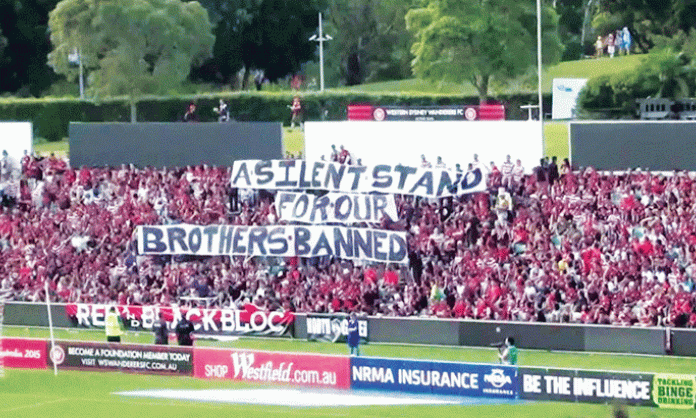The corporate media and football (soccer) officials this summer have launched a hysterical campaign against football fans. They have been especially keen to demonise independent and passionate fans of the Western Sydney Wanderers and Melbourne Victory clubs.
The latest barrage of headlines and sanctions against fans and clubs escalates an ongoing campaign to stifle “active support” – a section of fans who usually stand and sing for the whole game, lead chants and hold up banners in support of their team.
“Active fans” feel like they are not just spectators but active participants in helping their club win. They are often referred to as the “twelfth man” on the field. The campaign is also a smokescreen for the wider law and order agenda and a green light for disgusting racist and anti-working class attacks.
Collective punishment
The media-driven hysteria has culminated in collective punishment being doled out by the Football Federation Australia (FFA). Victory and the Wanderers have been charged with “bringing the game into disrepute” over a brawl that occurred miles from an A-League ground as well as the lighting of flares in the bay of travelling supporters.
The governing body has imposed sanctions on both clubs in an attempt to turn other fans against active fans who organise independently of the club.
The vocal and organised nature of football supporters distinguishes the game from other sports in Australia. The willingness of supporter groups to articulate a different vision of football culture – against the designs of the official corporate structures – is what gives them a certain edgy, rebellious quality that some find invigorating and many in the media and government find so concerning.
A recent Herald Sun piece outlined why the police and corporate officials are so concerned: “Briefing notes for [police] officers … describe soccer fans’ behaviour as ‘totally different to AFL and cricket’. It states they have a ‘touch one, touch all’ mentality” – a reference to the solidarity shown by different clubs’ supporters campaigning to defend other clubs’ fans against unjust bans and evictions.
For many years now, the presence of riot police, the public order response team and “anti-terror” security firm Hatamoto has increased at matches, with riot police marching into active support bays and evicting people.
Fans are filmed and monitored by police and security before, during and after games. Bans that cannot be appealed are handed out arbitrarily. Fans have been pepper sprayed by police. One Victory fan was punched in the face by security in December for holding up a banner reading “Football = freedom”.
Restrictions have been placed on Victory fans in the active support group North Terrace – which gives “European style” active support at the north end of the stadium, with a “capo” or captain leading chants on the megaphone.
They’ve been isolated from the rest of the crowd by tarpaulins on the wings. Scanners are used at entrances to heavily regulate entry into the active support areas. Banners for sub-groups within North Terrace have been banned, removing the right to freedom of association.
In Sydney, tifos, which are big banners held over the top of fans at the beginning of games, have been banned at what the police deem “high risk matches” because they want to monitor fans more easily. This is particularly the case for Western Sydney Wanderers fans.
Protests
Supporters groups like the Red and Black Bloc (Western Sydney) and North Terrace have not taken the attacks and intimidation lying down. The FFA and clubs have been all too happy to use these fans to sell the sport, so fans have held silent protests that starve the games of atmosphere.
Multiple games last season had portions played in silence as fans held up protest banners. One read “Corporate ties = media lies” and another “Hatamoto out of football”, referring to the security firm.
North Terrace fans have held up banners reading “1984”, chanted against the FFA and police, boycotted the designated section and boycotted giving active support. This response resulted in officials lifting sanctions.
Although the FFA’s punitive measures supposedly target the “anti-social behaviour” of a minority of “troublemakers”, it is the players and mass supporter base who suffer.
The language of “strong action” to protect the majority against an extreme and dangerous minority will be familiar to anyone who has witnessed the divide and rule approaches used against union militants, protest movements and migrant communities.
At the heart of the issue, a range of agendas are at play. These include Melbourne Victory’s insistence on control and surveillance, as well as the FFA’s determination to reduce the football experience to a sanitised, middle-class, so-called “family-friendly” environment.
But the spectre hanging over all of this is the imposition of law and order politics in the cultural sphere of professional sports.








